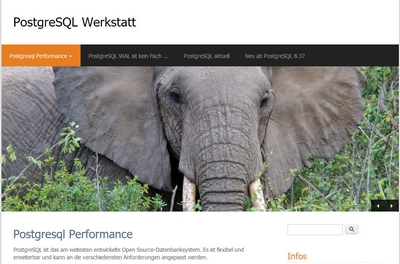Neues vom PostgreSQL Planet
Kaarel Moppel: No, you don't necessarily need extensions to compact Postgres tables
Jan Wieremjewicz: Planning Ahead for PostgreSQL 18: What Matters for Your Organization
Andreas 'ads' Scherbaum: Shlok Kumar Kyal
Andrei Lepikhov: Squeezing out Postgres performance on RTABench Q0
I often hear that PostgreSQL is not suitable for solving analytics problems, referencing TPC-H or ClickBench results as evidence. Surely, handling a straightforward task like sorting through 100 million rows on disk and calculating a set of aggregates, you would get stuck on the storage format and parallelisation issues that limit the ability to optimise the DBMS.
Hubert 'depesz' Lubaczewski: Waiting for PostgreSQL 19 – Display Memoize planner estimates in EXPLAIN
Jeremy Schneider: Graviton2 versus Graviton4
Just a short post, because I thought this was pretty remarkable. Below, I have screenshots showing the CPU utilization of two AWS instances in us-west-2 which are running an identical workload.
Aya Iwata: A journey toward the Columnar Data Store
I had the pleasure of speaking at PGConf.dev in Montreal, where I delivered a session on Columnar Data Store—a topic that’s quietly transforming the way we handle large-scale analytics in PostgreSQL. In this post, I’ll walk you through the core ideas from my talk and explain why columnar storage isn’t just a performance boost—it’s a game changer for modern data workloads.
Cornelia Biacsics: Contributions for the weeks 30 & 31 (2025-07-21 to 2025-08-03)
Catching with all contributions. PGDay UK published their schedule. Registration is still open. Here is their program committee
Mankirat Singh: Tables turn, So does my project
Dave Stokes: Data Security and AI - Sharing Your PostgreSQL Database With Ollama AI
You may want AI with your data but do not wish your prompts to end up in a search engine, especially if you are working with sensitive data.
Magnus Hagander: Nordic PGDay 2026 - Returning to Helsinki
Nordic PGDay 2026 will return to Helsinki, Finland, on March 24. See our website for details, and stay tuned for more!
Ian Barwick: PgPedia Week, 2025-07-20
This week's edition is unfortunately delayed due to personal reasons.
PostgreSQL 19 changes this week psql : variable SERVICEFILE added PostgreSQL 18 changes this weekMain item of note this week: PostgreSQL 18 Beta 2 has been released
Christoph Berg: The Debian Conference 2025 in Brest
It's Sunday and I'm now sitting in the train from Brest to Paris where I will be changing to Germany, on the way back from the annual Debian conference. A full week of presentations, discussions, talks and socializing is laying behind me and my head is still spinning from the intensity.
Pollito and the gang of DebConf mascots wearing their conference badges (photo: Christoph Berg)Table of Contents
Dave Stokes: PostgreSQL, Ollama, and the DBeaver AI Assistant
Ollama is an open-source project that simplifies running large language models (LLMs). It runs locally on your machine, and you can choose from multiple LLMs. Keeping all the data on your machine should provide a security bonus.
DBeaver is a universal database tool with an AI Assistant. This assistant provides an extra layer of security by allowing you to lock down what is shared, with the default being metadata only, no data.
Andreas 'ads' Scherbaum: Polina Bungina
Ming Ying: Case Study: Bilt Reduces Postgres Query Timeouts by 95% with ParadeDB
Sergey Solovev: pg_dphyp: teach PostgreSQL to JOIN tables in a different way
Greetings!
I work in Tantor Labs as a database developer and naturally I am fond of databases. Once during reading the red book I have decided to study planner deeply. Main part of relational database planner is join ordering and I came across DPhyp algorithm that is used in most modern (and not so much) databases. I wonder - is there is anything in PostgreSQL? Surprisingly, nothing. Well, if something does not exist, you need to create it yourself.
Nikolay Samokhvalov: Self-driving Postgres
I'm excited to announce that Postgres AI has started work on a new project – open-source Self-Driving Postgres (SDP).
In the AI era, Postgres is the natural choice for AI builders. With fast-growing database clusters, the highest level of automation is essential. AI-driven growth demands efficient, proactive, and intelligent database management. Our goal is to reduce manual interventions as much as possible to achieve the highest level of operational efficiency and reliability.
How can we define levels of automation?
Sahithi Bollepally: PostgreSQL 16 Installation on RHEL/CentOS – Step-by-Step Guide
In today’s digital world, data is at the heart of every application, from social media platforms to banking systems, from e-commerce websites to IoT devices. To manage this data efficiently, reliably, and securely, we need a robust system known as a database management system (DBMS). Among the many DBMS options available, PostgreSQL stands out as a top choice for developers and enterprises alike.
Here’s why PostgreSQL is a go-to database for modern applications:
Nikolay Samokhvalov: Introducing Postgres how-tos: practical guides for real-world database challenges
Today, as part of our Launch Week (Day 4), we're excited to announce the release of our Postgres how-to guides collection – a comprehensive set of dozens of practical guides covering real-world PostgreSQL challenges.

